March 2022 Daily Notes
3.31.22
Sketch for About page (new website template):
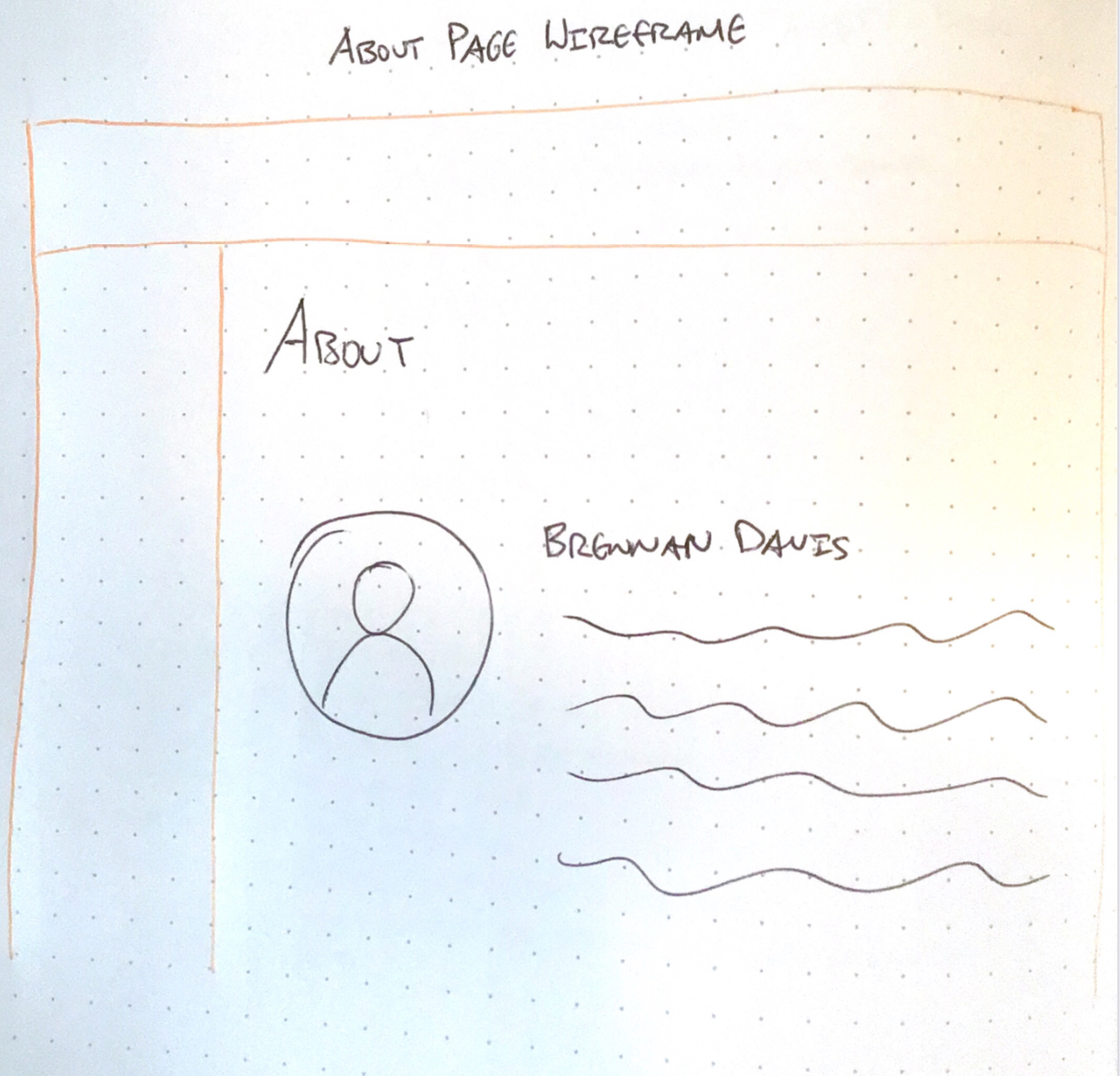
3.30.22
Sketch for Pixel Art page (new website template):
3.29.22
I'm running a personal sprint this week in order to get all the sketches for my website done. I'd really like to get to the point where I can start working on the code. Here's what the individual Keys to Productivity pages will look like:
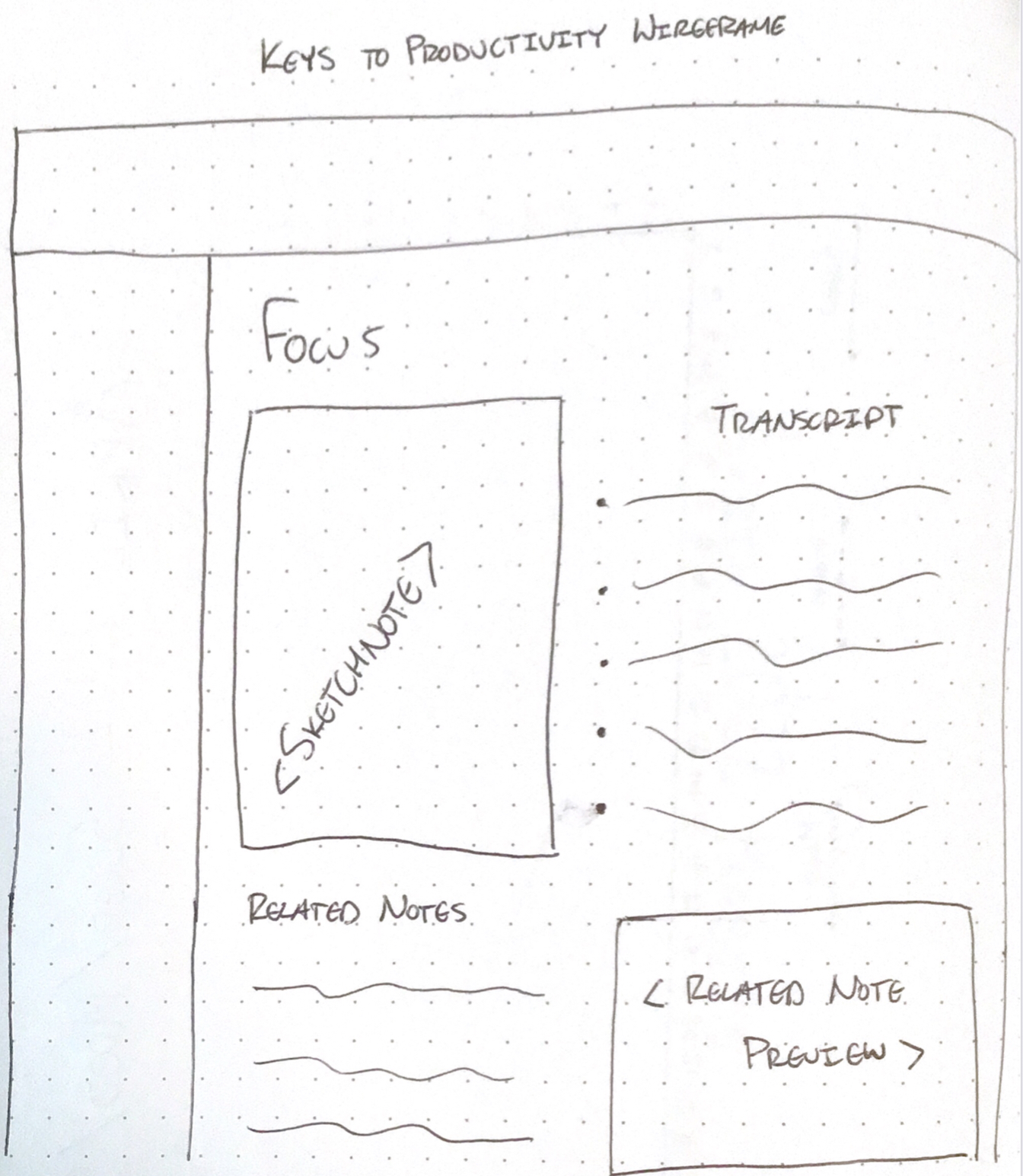
3.28.22
Finally did another sketch for my new website template. This one is for my individual Book Notes pages:
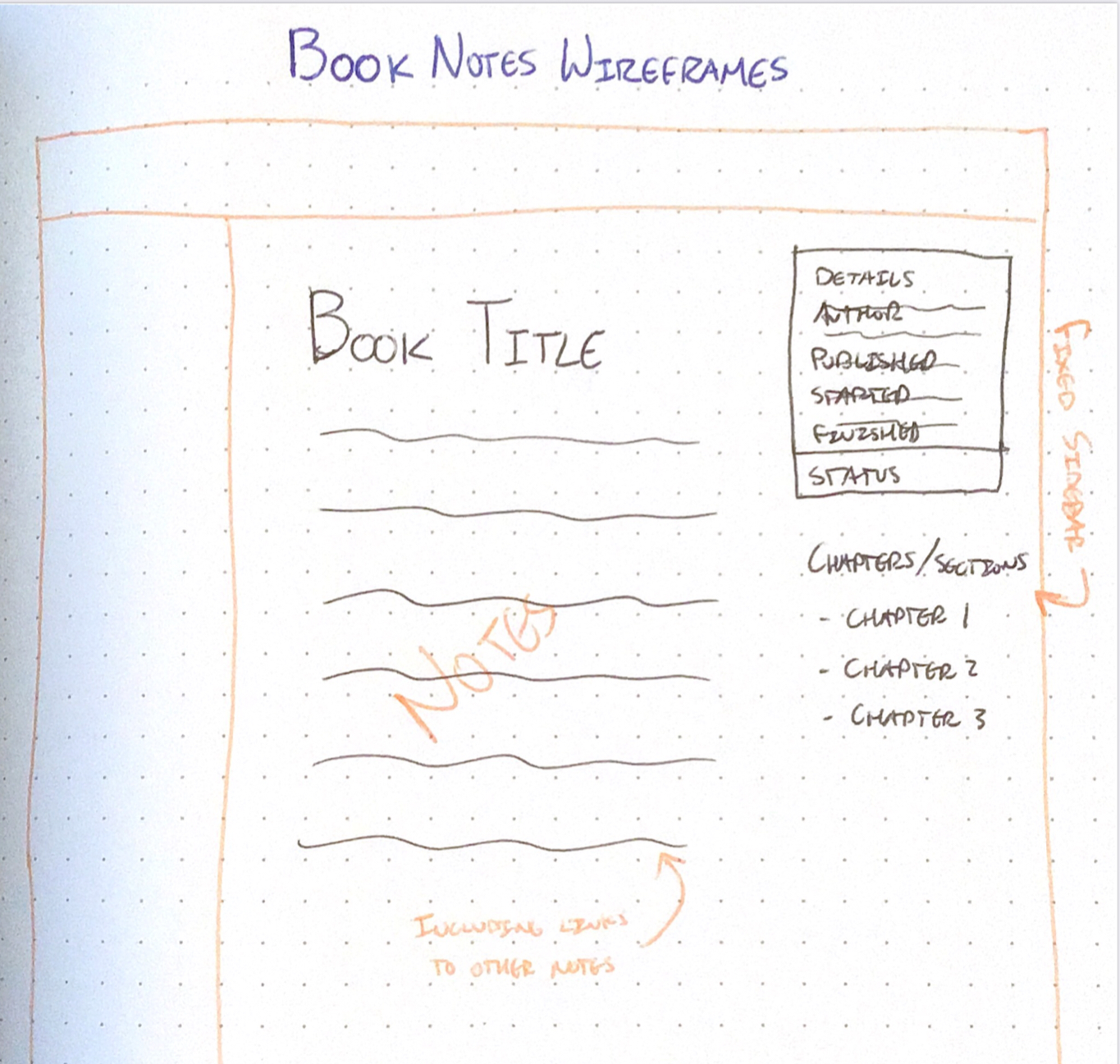
3.25.22
It's a great feeling as work ends on Friday afternoon to shut my computer down, silence my devices, and just look out my front window. We planted some flower bulbs in our yard in the fall, and they've just started to push up through the soil this past week. I've enjoyed looking at them each day and seeing their slow but steady progress. It feels good to just be still after a busy work week and observe nature. It's refreshing and rejuvenating. There are so many small moments and miracles in life, and it's great when I get to slow down and see them. It fills me with joy and hope.
3.24.22
I've struggled in recent years to find time to read many books. Reading is something I enjoyed so much as a kid, and I've really missed it. I've made it more of a priority this year, while at the same time decreasing the dependence I've had on my phone. Turns out there's a lot of time to read when you cut out endlessly and mindlessly scrolling through news feeds and YouTube playlists. I've already finished 4 books this year, and it has felt amazing. I've been taking notes on the books I'm reading, and have been linking ideas together in Obsidian. I've been seeing connections to what I'm reading in my every day life, and it has enriched conversations and interactions I've had with others. The more I get myself off my phone and into reading books (and using my Bullet Journal), the happier and more fulfilled I feel. A couple of books that have really helped me are Make Time and How to Break Up With Your Phone. They both contain lots of great advice on how to break the addiction we've developed to our phones, and how to utilize your time doing the things you really want to do.
3.23.22
Webinar: Nick Milo: The Joy of Thinking and the Rise of the Note Maker
You don't have to agree with everything the author says. In fact, it's good if you don't entirely agree. This is how new ideas and thoughts on a subject are born: articulation of counter points.
3.21.22
Webinar: Nick Milo: The Joy of Thinking and the Rise of the Note Maker
Nick used the term "Toxic Productivity" several times throughout his presentation. I didn't quite catch his exact definition, but from what I could gather he was referring to the extreme focus on getting more and more stuff done, and not enough focus on the why. We often mistake busyness as being productive, but as just about any book, article, or video on productivity will tell you, being busy doesn't necessarily mean we're focusing on the highest priority items. Toxic Productivity also focuses entirely on consuming and collecting rather than deep thinking and creating. If all we're doing is making ourselves fruitlessly busy, we won't ever feel fulfilled, and we'll prevent ourselves from ever developing our own ideas and engaging in deep thought.
3.18.22
Webinar: Nick Milo: The Joy of Thinking and the Rise of the Note Maker
Nick mentioned that directly re-sharing content doesn't lead to deep thinking about the content. I believe that's only partially true. It depends on if that's where your interaction with the content ends. I, for instance, when sharing content take things a step further and post the notes I took in my own words about the content, not just a link. That way I'm showing what I considered to be valuable or inspirational while consuming the content.
In the book Show Your Work, Austin Kleon talks about sharing things we like and draw inspiration from as a way of showing how you got from Point A to Point B. The Daily Notes I've been sharing on my website are a way for me to show how the ideas, opinions, systems, etc. I formulate came to be, and it allows me to have conversations with others who are interested in the same topics and ideas. I'm then introduced to their thoughts, which I then link with other thoughts I've had on other topics as well.
There is value in sharing if done in a way that shows and encourages deeper thinking.
3.17.22
Side projects have always been a great way for me to test out new technologies and processes outside of what I'm doing at work. I'm able to explore new ideas, and then find ways to apply what I've learned back into my job. It also works the other way. We've started moving from plain JavaScript over to TypeScript at work, and as a way of learning it better, I'm looking at using TypeScript as I rebuild the template for my website. I'm hoping to learn much more quickly by using the technology in multiple places at the same time. I love it when knowledge can be more widely applied like that.
3.16.22
Book: How to Break Up With Your Phone
Short notes I took on Chapter 5: The Truth About Multitasking:
Our phones encourage us to multitask, which has been proven isn't actually possible. Our constant switching between tasks makes it harder for our brains to focus and weakens our memory. All of this makes it harder to single task as well.
3.15.22
Article: When taking notes, what's worth capturing?
Notes I took on the above article:
Places for ideas to land:
- Clearly important --> straight into main notes
- Unique ideas that stick in your memory without writing them down
- Don't strike a chord --> trash
- Ideas you're unsure of --> parking lot
Which ideas to capture?
- Emotional Resonance
- Guiding Question --> only record what answers the question
- Your Why --> ideas related to the purpose for consuming the content
- Actionable Ideas
- Repeated Ideas
- Only capture new ideas regarding a subject you already know
- Stories
Prepare to take notes:
- Pick filters
- Organize materials
- Set up parking lot
After taking notes:
- Highlight / bold important words / phrases
- Decide which ideas in parking lot worth keeping
- Consider what you might want to do differently next time
3.14.22
I've been reading a lot of books lately, and I've been experimenting with different note strategies and structures from book to book.
The first several books I tried Tiago Forte's Progressive Summarization technique, but found I don't really go back to my notes afterward to do the summarization part. I end up with a bunch of direct quotes that lose their context when I do get around to reviewing them.
I then tried creating a central note for the book in Obsidian, then have each of the chapters be a separate note that link back to the master note. I switched to writing my notes out in my own words rather than copying direct quotes, and I felt I remembered more by doing so.
I discovered during my last book that Obsidian allows you to link directly to headings in a note, and it includes any notes under the heading. I really like this because I can create a heading for each chapter in a single note, and can link to the chapters from other places. This is most likely how I'm going to be organizing my book notes from now on.
The most important part about this process was that it was a series of small iterations/experiments that led me to a note taking strategy that works really well for me. I probably wouldn't have landed where I did if I'd tried to get there right out of the gate.
3.11.22
I finished reading The Bullet Journal Method today. Despite having kept a Bullet Journal since 2016, I was able to gain some good insights and inspiration while reading the book. I recommend it for beginners and advanced users alike.
I've enjoyed my time Bullet Journaling over the years. It has helped me gain a greater understanding of myself, and helped me be much more proactive when it comes to what I want to accomplish in my life. Reading The Bullet Journal Method has once again inspired me to write my own book on productivity, something I've actually attempted in the past. I plan to use what I've learned to help me organize the project, and perhaps I too can become a published author.
3.9.22
I had the idea to link cards in an Obsidian Kanban board to tasks in Things so I could create sprint boards across multiple projects (something I can't do in Things). Shortly into investigating the Obsidian Kanban plugin, though, I was reminded that sprints are best when they're focused on a single goal or project so there's a working deliverable by the end. I can simply use the projects I create in Things to run my personal sprints, so this connection to Kanban boards in Obsidian became unnecessary. I had in mind some cool ways of automating the connection between the two apps, but now I don't have to waste time building a tool I won't end up using.
3.8.22
Book: The Bullet Journal Method
Notes I took while reading a section on Custom Collections in The Bullet Journal Method:
-
Don't make collections / projects just for the sake of it. Make sure the information is serving a purpose and adds value to you.
-
Kick off projects with a Brainstorming session
- Blank spread in Bullet Journal
- Map of Content in Obsidian
-
Project Mission Statement template:
I want to _____ [what] so that I can _____ [why] by _____ [how].
- Ryder Carroll's mission statement for writing his book:
I want to write a book so that I can teach people how to have more agency over their life by sharing the knowledge I've found valuable for living intentionally.
- Find and understand your motivation before taking on any new projects.
3.7.22
I've been trying to not be so tied to my phone, and have been slowly removing unneeded and/or distracting apps. I long ago removed all social media apps (except for LinkedIn during my job hunt last year). This past week I removed LinkedIn, YouTube, and Spark Mail from my phone. I don't need to constantly be checking my email and scrolling endlessly through LinkedIn and YouTube. I want to be much more intentional with my time, and I don't want my default behavior to be to pick up my phone. I've found myself multiple times over the last few days picking up my phone to look at one of my removed apps and realizing they're not there anymore. It's made me think about other ways to spend my time, and I'm happy to say I've spent more time reading, writing, and simply sitting and thinking. The nice thing is, I don't find I miss those apps at all. I can still access them on other devices when I need/want to, but I'm much more intentional about it since they're no longer within such easy reach.
I read about the idea of having a minimal phone in the book Make Time by Jake Knapp and John Zeratsky.
3.4.22
Video: Wisdom and Order
Notes I took on the above video:
-
We can't always operate at maximum efficiency. We'll get burned out.
-
Focus on one thing at a time.
- Personal Sprints
-
Ask Heavenly Father in prayer for guidance on what to prioritize and when.
-
The Gospel and Productivity are related subjects <-- Idea to flesh out more in the future
3.3.22
I sketched out an idea of what I want the Daily Notes Archives page to look like in the new website template I'm building:
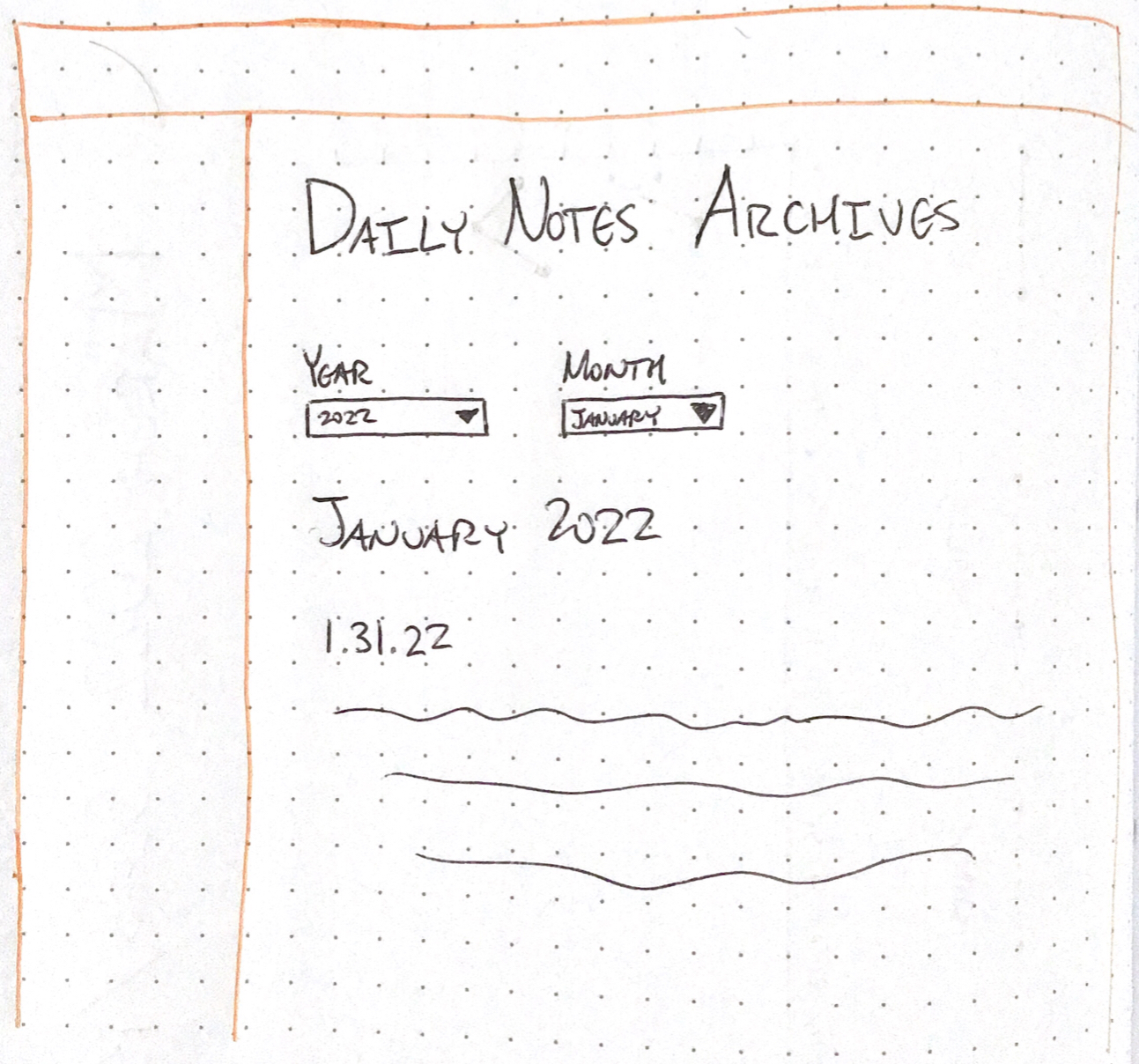
The framework I'm using, NuxtJS along with the NuxtJS Content module (whose template I'm currently using for my site), produce a static website, so I may not be able to dynamically populate the page based on the year and month dropdowns, so I sketched out an alternative look:
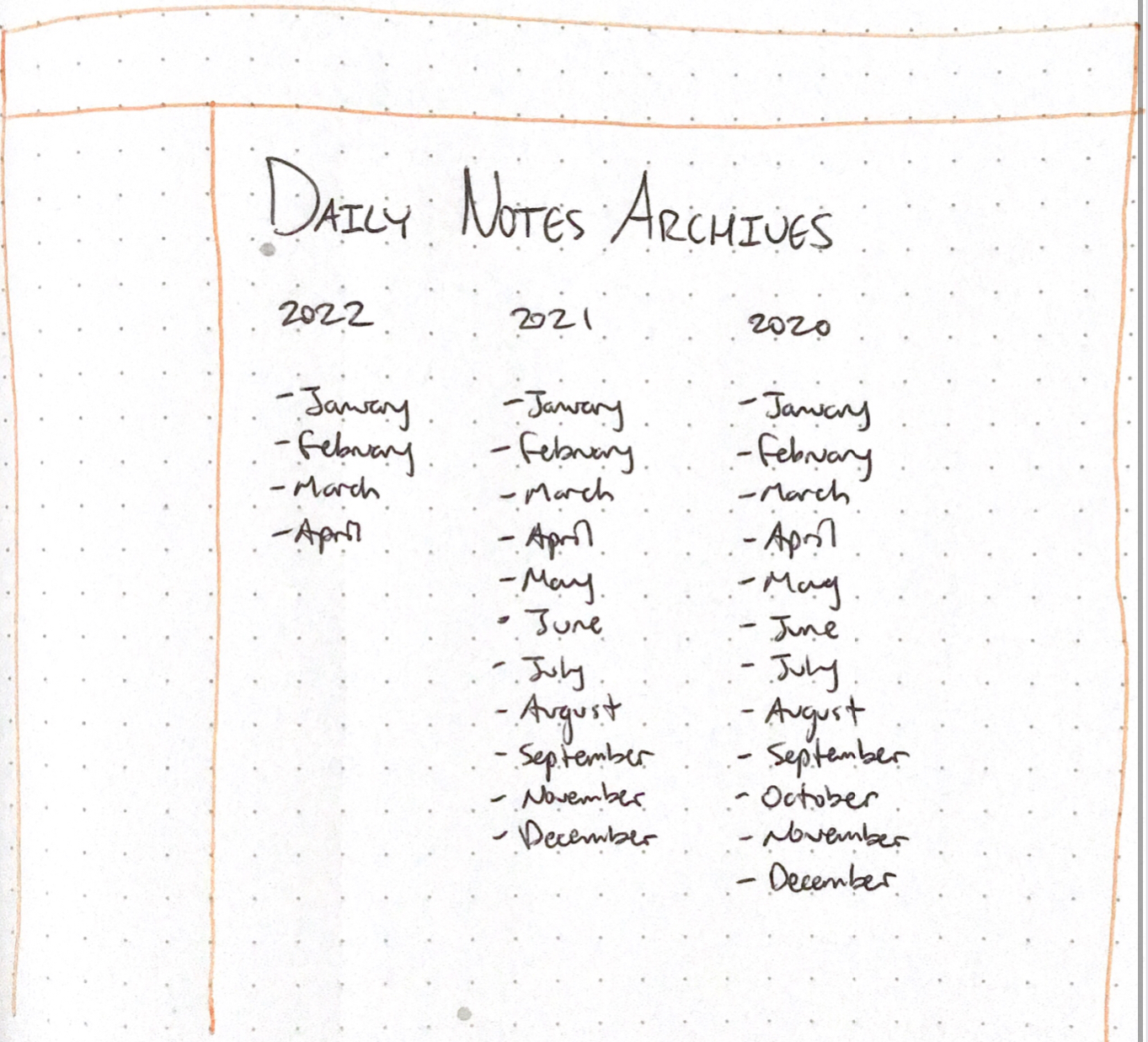
I'm looking for my new website template to still have a minimal design and not be too difficult to build.
3.2.22
Book: The Bullet Journal Method
Some quotes from a section on Control in The Bullet Journal Method:
"I've had a lot of worries in my life, most of which never happened.
-- Mark Twain
"If a problem can be solved, there is no use worrying about it. If it can't be solved, worrying will do no good."
-- Dalai Lama
3.1.22
Book: The Bullet Journal Method
Notes I took while reading a section on Gratitude in The Bullet Journal Method:
-
Take a moment each time you mark something off your list to celebrate the accomplishment.
-
Give yourself a gift each day by being grateful for the small moments in your life (someone smiled at you, a coworker liked one of your ideas, you had the opportunity to help someone, or someone helped you, etc.)